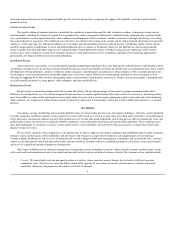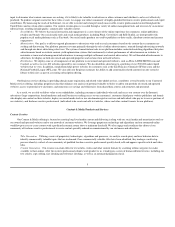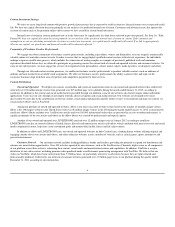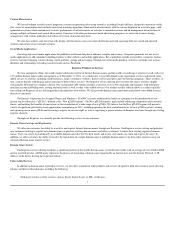Enom 2011 Annual Report Download - page 18
Download and view the complete annual report
Please find page 18 of the 2011 Enom annual report below. You can navigate through the pages in the report by either clicking on the pages listed below, or by using the keyword search tool below to find specific information within the annual report.
of operations.
Furthermore, brands and advertisers are increasingly focusing a portion of their online advertising budgets on social media outlets such as
Facebook. If this trend were to continue and we were unable to offer a competitive or similar advertising opportunity, this could adversely impact our ability
to maintain or increase our revenue from advertising.
Lastly, we believe that advertising spending on the Internet, as in traditional media, fluctuates significantly as a result of a variety of factors, many
of which are outside of our control. These factors include:
• variations in expenditures by advertisers due to budgetary constraints;
• the cancellation or delay of projects by advertisers;
• the cyclical and discretionary nature of advertising spending;
• general economic conditions, as well as economic conditions specific to the Internet and online and offline media industry; and
• the occurrence of extraordinary events, such as natural disasters, international or domestic terrorist attacks or armed conflict.
If we are unable to generate advertising revenue due to factors outside of our control, then our business, financial condition and results of operations would be
adversely affected.
Since the success of our Content & Media service offering has been closely tied to the success of eHow, if eHow’s performance falters it could have a
material adverse effect on our business, financial condition, and operations.
For the years ended December 31, 2010 and 2011, Demand Media generated approximately 25% and 31%, respectively, of our revenue from
eHow. No other individual site was responsible for more than 10% of our revenue in these periods. In addition, most of the content that we published during
these periods was published to eHow.
eHow depends on various Internet search engines to direct traffic to the site. For the year ended December 31, 2011, approximately 54% of eHow’s
page view traffic came from Google searches. The traffic directed to eHow and in turn the performance of the content created for and distributed on eHow
may be adversely impacted by a number of factors related to Internet search engines, including the following: any further changes in search engine algorithms
or methodologies similar to those recently implemented by Google, which changes had a negative effect on search referral traffic to eHow and a reduction in
page views on eHow; our failure to properly manage SEO efforts for eHow; our failure to prevent internal technical issues that disrupt traffic to eHow; or
reduced reliance by Internet users on search engines to locate relevant content. Additionally, we have already produced a significant amount of content that is
housed on eHow and it may become difficult for us to continue to identify topics and produce content with the same level of broad consumer appeal as the
content we have produced up to this point. A material adverse effect on eHow could result in a material adverse effect to Demand Media and its business,
financial condition, and results of operations.
Poor perception of our brands, business or industry could harm our reputation and adversely affect our business, financial condition and results of
operations.
Our business is dependent on attracting a large number of visitors to our owned and operated websites and our network of customer websites and
providing leads and clicks to our advertisers and customers, which depends in part on our reputation within the industry and with our customers. Because our
business is transforming traditional content creation models and is therefore not easily understood by casual observers, our brands, business and reputation are
vulnerable to poor perception. For example, perception that the quality of our content may not be the same or better than that of other published Internet
content, even though baseless, can damage our reputation. We are frequently the subject of unflattering reports in the media about our business and our model.
While disruptive businesses are often criticized early on in their life cycles, we believe we are more frequently targeted than most because of the nature of the
business we are disrupting—namely the traditional print and publication media as well as popular Internet publishing methods such as blogging. Any damage
to our reputation could harm our ability to attract and retain advertisers, customers and freelance creative professionals who create a majority of our content,
which would materially adversely affect our results of operations, financial condition and business. Furthermore, certain of our owned and operated websites,
such as LIVESTRONG.com and eHow, as well as some of the content we produce for our network of customer websites, are associated with high-profile
experts to enhance the websites’
14
























